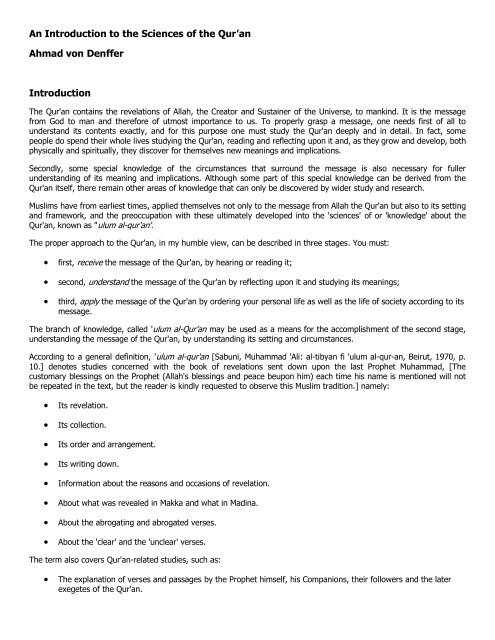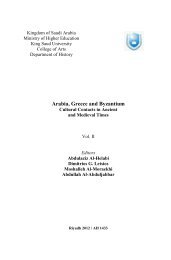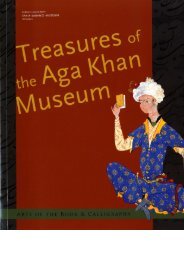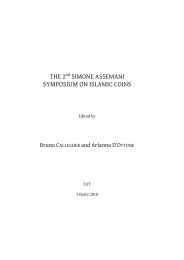ulum-al-quran
ulum-al-quran
ulum-al-quran
You also want an ePaper? Increase the reach of your titles
YUMPU automatically turns print PDFs into web optimized ePapers that Google loves.
An Introduction to the Sciences of the Qur’an<br />
Ahmad von Denffer<br />
Introduction<br />
The Qur'an contains the revelations of Allah, the Creator and Sustainer of the Universe, to mankind. It is the message<br />
from God to man and therefore of utmost importance to us. To properly grasp a message, one needs first of <strong>al</strong>l to<br />
understand its contents exactly, and for this purpose one must study the Qur'an deeply and in detail. In fact, some<br />
people do spend their whole lives studying the Qur'an, reading and reflecting upon it and, as they grow and develop, both<br />
physic<strong>al</strong>ly and spiritu<strong>al</strong>ly, they discover for themselves new meanings and implications.<br />
Secondly, some speci<strong>al</strong> knowledge of the circumstances that surround the message is <strong>al</strong>so necessary for fuller<br />
understanding of its meaning and implications. Although some part of this speci<strong>al</strong> knowledge can be derived from the<br />
Qur'an itself, there remain other areas of knowledge that can only be discovered by wider study and research.<br />
Muslims have from earliest times, applied themselves not only to the message from Allah the Qur'an but <strong>al</strong>so to its setting<br />
and framework, and the preoccupation with these ultimately developed into the 'sciences' of or 'knowledge' about the<br />
Qur'an, known as "<strong>ulum</strong> <strong>al</strong>-qur'an'.<br />
The proper approach to the Qur'an, in my humble view, can be described in three stages. You must:<br />
<br />
<br />
<br />
first, receive the message of the Qur'an, by hearing or reading it;<br />
second, understand the message of the Qur'an by reflecting upon it and studying its meanings;<br />
third, apply the message of the Qur'an by ordering your person<strong>al</strong> life as well as the life of society according to its<br />
message.<br />
The branch of knowledge, c<strong>al</strong>led '<strong>ulum</strong> <strong>al</strong>-Qur'an may be used as a means for the accomplishment of the second stage,<br />
understanding the message of the Qur'an, by understanding its setting and circumstances.<br />
According to a gener<strong>al</strong> definition, '<strong>ulum</strong> <strong>al</strong>-qur'an [Sabuni, Muhammad 'Ali: <strong>al</strong>-tibyan fi '<strong>ulum</strong> <strong>al</strong>-qur-an, Beirut, 1970, p.<br />
10.] denotes studies concerned with the book of revelations sent down upon the last Prophet Muhammad, [The<br />
customary blessings on the Prophet (Allah's blessings and peace beupon him) each time his name is mentioned will not<br />
be repeated in the text, but the reader is kindly requested to observe this Muslim tradition.] namely:<br />
<br />
<br />
<br />
<br />
<br />
<br />
<br />
<br />
Its revelation.<br />
Its collection.<br />
Its order and arrangement.<br />
Its writing down.<br />
Information about the reasons and occasions of revelation.<br />
About what was reve<strong>al</strong>ed in Makka and what in Madina.<br />
About the abrogating and abrogated verses.<br />
About the 'clear' and the 'unclear' verses.<br />
The term <strong>al</strong>so covers Qur'an-related studies, such as:<br />
<br />
The explanation of verses and passages by the Prophet himself, his Companions, their followers and the later<br />
exegetes of the Qur'an.





